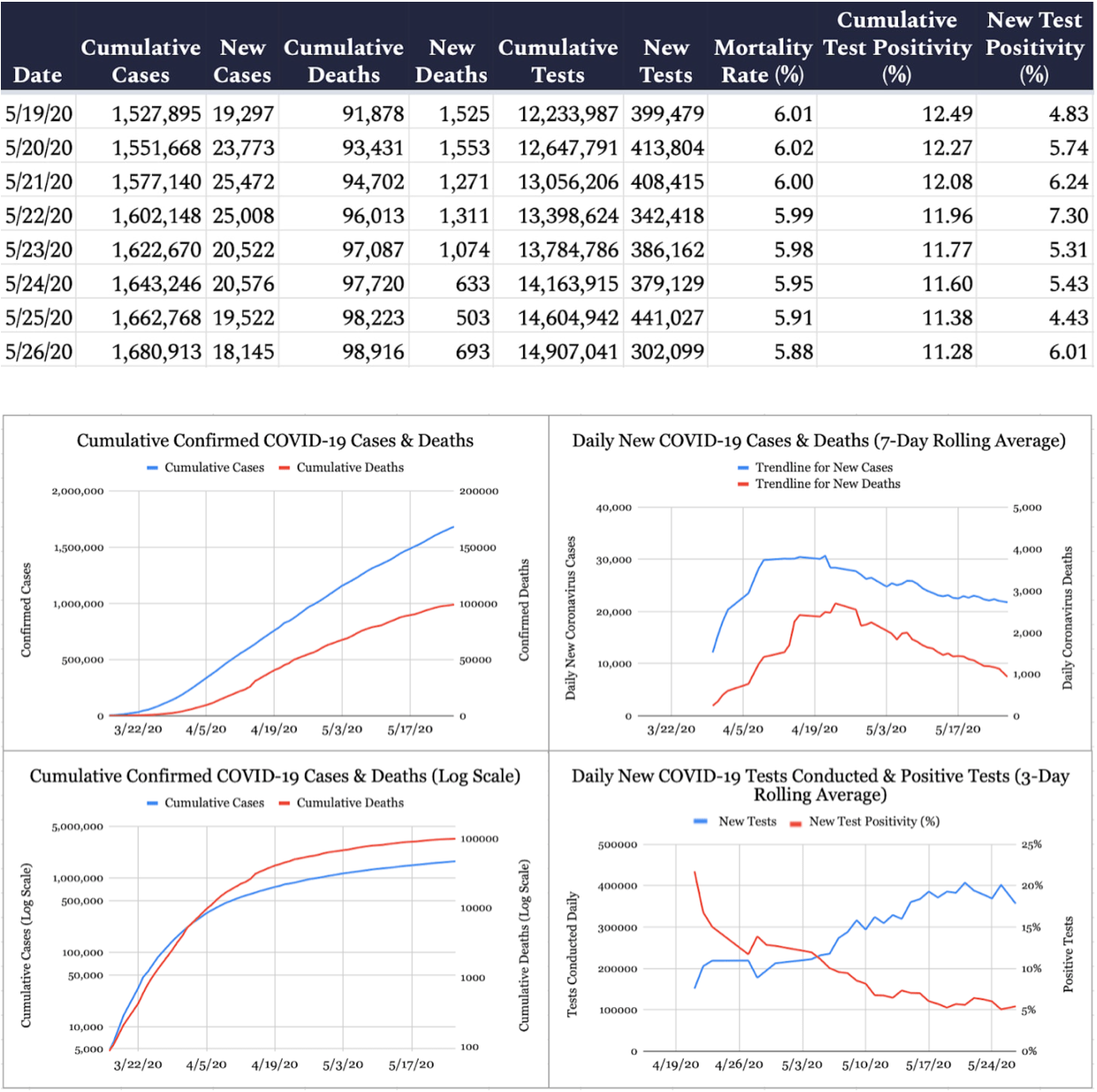Happy Wednesday! If you had the 2016 University of Cincinnati football team’s record playing a role in Republicans’ efforts to win back a Senate seat in Alabama four years later, collect your winnings.
Quick Hits: Today’s Top Stories
As of Tuesday night, 1,680,913 cases of COVID-19 have been reported in the United States (an increase of 18,145 from yesterday) and 98,916 deaths have been attributed to the virus (an increase of 693 from yesterday), according to the Johns Hopkins University COVID-19 Dashboard, leading to a mortality rate among confirmed cases of 5.9 percent (the true mortality rate is likely much lower but it’s impossible to determine precisely due to incomplete testing regimens). Of 14,907,041 coronavirus tests conducted in the United States (302,099 conducted since yesterday), 11.3 percent have come back positive.

The Maryland biotech company Novavax announced the beginning of human clinical trials for its coronavirus vaccine. The company will enroll 130 healthy individuals in the study.
The Justice Department announced Tuesday it was closing its investigations into three U.S. senators for potential violations of insider trading laws, but continuing to pursue a related investigation into North Carolina Sen. Richard Burr. The investigation was opened in response to concerns about a number of senators selling off stocks after being privy to confidential briefings at the outset of the pandemic, which presented a potential violation of the 2012 Stop Trading On Congressional Knowledge (STOCK) Act.
Lori Klausutis’s widower wrote a letter to Twitter CEO Jack Dorsey asking him to take down President Trump’s tweets asserting a conspiracy theory that MSNBC television host Joe Scarborough murdered Klausutis’s deceased wife when she worked for then-Rep. Scarborough. Twitter has said it will not remove the tweets and Trump has doubled down on the conspiracy, insisting Klausutis’s family wants “to get to the bottom of it.”
Four Minneapolis police officers were fired on Tuesday after a harrowing video was released showing one kneeling on the neck of George Floyd, an African American man initially stopped on a report of forgery. Floyd can be heard crying out in the video that he could not breathe, and he later died. Police Chief Medaria Arradondo said he asked the FBI to investigate the incident.
The New York Stock Exchange trading floor partially reopened yesterday after being closed for nearly two months. The initial results were good: The S&P 500 rose more than 1 percent.
Glenn Fine, the former inspector general for the Department of Defense who was tasked with acting as an independent watchdog to oversee the implementation and distribution of the $2 trillion coronavirus aid package, resigned from his Pentagon job on Tuesday after having been ousted from the Pandemic Response Accountability Committee by President Trump in early April.
The National Hockey League has officially released its Return to Play Plan, confirming that, if action resumes, the league will finish the 2019-2020 season by moving directly into a postseason qualification stage sometime this summer.
Trump Doubles Down on His Latest Conspiracy Theory

Over the last few years, President Trump has periodically taken to Twitter to accuse MSNBC host Joe Scarborough, one of his most prominent media critics, of murdering a staffer when he was a congressman in the early 2000s, riffing on the fact that a young woman fell, hit her head, and died in his office in 2001. On previous occasions, the accusation passed largely unnoticed—a few rote fact checks and Twitter denunciations, and it was swept onto the heaping pile of the president’s other Twitter outbursts.
Over the past week, however, the same accusation has become a multiday story, as Trump has amplified the conspiracy repeatedly and added the unfounded suggestion that the young staffer in question, Lori Klausutis, had been having an affair with Scarborough.
It was all too much for Klausutis’ widower, Timothy Klausutis, who described the pain of his family and hers in an open letter to Twitter CEO Jack Dorsey asking Twitter to delete the tweets.
“As her husband, I feel that one of my marital obligations is to protect her memory as I would have protected her in life,” Klausutis wrote. “I’m asking you to intervene in this instance because the President of the United States has taken something that does not belong to him—the memory of my dead wife—and perverted it for perceived political gain.”
Twitter declined to take down the tweets. Not surprisingly, the president set aside the wishes of the Klausutis family and, later Tuesday morning, doubled down:
At a press conference later in the day, White House press secretary Kayleigh McEnany got into the action as well.
“Why is the president making these unfounded allegations?” a reporter asked. “This is pretty nuts, isn’t it—the president is accusing someone of possible murder, the family is pleading with the president to please stop unfounded conspiracy theories—why is he doing this?”
McEnany did not answer the question directly, but referenced a 2003 clip from Don Imus’ radio show—equally grotesque—in which Scarborough laughed along as Imus made a joke about killing an intern. “It’s Joe Scarborough that has to answer these questions,” she said.
She added: “I do know that our hearts are with Lori's family at this time.”
Big Tech Takes Center Stage
As mentioned above, Twitter decided against taking down President Trump’s tweets about Joe Scarborough per Klausutis’s request. A spokesman for the company said they were “deeply sorry about the pain these statements … are causing the family,” adding that they were working on product features to “more effectively address things like this going forward.”
But Twitter did take a big step on Tuesday, adding a fact-checking tag to one of Trump’s tweets for the first time.

Clicking through to “get the facts” takes users to a separate page, where the further information awaits them:

Merits of Trump’s claim and Twitter’s fact check aside—though Rachel Kleinfeld wrote an excellent piece for us last month explaining just how few cases of voter fraud have been documented in recent years—the move marks a significant departure from the social network’s previous stance on the Trump conundrum.
Twitter has long ignored calls from critics of the president to censor or otherwise tamper with Trump’s feed, arguing that—even if he violates the platform’s rules—tweets from elected officials are in the “public interest.” And despite President Trump accusing the company of “completely stifling FREE SPEECH,” it still is not censoring him—just including additional context to his post. You know how we know? He posted the message on … Twitter.
But Tuesday’s decision still opens up an entirely new can of worms. Will Twitter now fact check all false or misleading statements on the platform, or just Trump’s? Should tweets that don’t include a “Get The Facts” tag be presumed accurate? Which fact-checkers will be relied upon to correct erroneous claims? (We have a suggestion for that last one.)
Under Section 230 of the 1996 Communications Decency Act, internet platforms like Twitter, Facebook, and Google are not liable for the content users post in the same way publishers would be. “No provider or user of an interactive computer service shall be treated as the publisher or speaker of any information provided by another information content provider,” the legislation reads.
Some Republican lawmakers—Sens. Josh Hawley, Ted Cruz, and Marco Rubio chief among them—have argued for years that these platforms are biased against conservative viewpoints, which, in their eyes, makes them publishers rather than mere platforms. Twitter’s move yesterday earned their scorn.
“And @Twitter is getting subsidized by the federal government for that interference in the form of special immunity worth billions. Time to end #BigTech sweetheart deal w/ government,” tweeted Hawley.
Rubio added: “[if] they have now decided to exercise an editorial role like a publisher then they should no longer be shielded from liability & treated as publishers under the law.
But as written, Section 230 does leave room for internet companies—private-sector businesses in their own right—to moderate their platforms without sacrificing the legislation’s liability protections:
“No provider or user of an interactive computer service shall be held liable on account of any action voluntarily taken in good faith to restrict access to or availability of material that the provider or user considers to be obscene, lewd, lascivious, filthy, excessively violent, harassing, or otherwise objectionable, whether or not such material is constitutionally protected.”
Law professor Jeff Kosseff refers to Section 230 as “the twenty‐six words that created the internet,” arguing that “absent that sentence, social media platforms would have strong incentives to suppress any speech that might cause them legal woes” or “avoid legal liability by not moderating their forums at all, likely rendering them unusable.”
This debate isn’t going anywhere. Hawley has proposed legislation that would require private social media companies prove to a government agency their algorithms and moderation systems don’t “negatively affect a political party, political candidate, or political viewpoint.” We likely haven’t heard the last from Trump on the matter. Joe Biden has said Section 230 “should be revoked.”
YouTube’s CCP censorship fiasco:
YouTube has come under fire in recent days after the technologist Palmer Luckey tweeted that the video-sharing website—owned by Google—systematically deleted every comment that he made about the Wumao, an internet propaganda arm of the Chinese Communist Party. “This appears to be a new global policy on YouTube, not directed at me specifically,” he followed up. “Try saying anything negative about the [Wumao], or even mentioning them at all. Your comment will last about 30 seconds and get deleted without warning or notice, CCP-censor style. To what end?” Other users reported similar experiences.
This revelation quickly caught the eye of some of the very same politicians mentioned above. “I’d like to know the answer to this @Google,” Sen. Hawley tweeted. Sen. Cruz argued that the “censorship” was “very disturbing.”
YouTube spokesman Farshad Shadloo responded in a statement provided to the New York Times: “This appears to be an error in our enforcement systems and we are investigating. Users can report suspected issues. ... These removals were not a result of a policy change.”
From James Vincent in The Verge:
These phrases seem to have been accidentally added to YouTube’s comment filters, which automatically remove spam and offensive text. The comments are removed too quickly for human moderation and are deleted even if the banned phrases are used positively (e.g., “The 五毛 are doing a fantastic job”). YouTube says it’s been relying more on its automated filters in recent months due changes to its workforce brought about by the pandemic.
Worth Your Time
To complete today’s Big Three social media trifecta: A new report from The Wall Street Journal reveals that Facebook’s own employees have been internally raising concerns about the platform’s exacerbation of partisan polarization since 2016. But despite being quietly warned of mounting evidence that the website’s algorithms “exploit the human brain’s attraction to divisiveness,” Facebook CEO Mark Zuckerburg was apparently uninterested in making algorithm edits “in the name of social good,” eventually telling employees that he was “losing interest” in the subject and wanted to focus on other issues. This report comes as Facebook’s algorithms are increasingly being scrutinized from both sides of the aisle, with conservatives criticizing the social media giant for being overly censorious and progressives arguing that the algorithm is not proactive enough in fighting divisive and misleading rhetoric.
Noah Rothman wrote an excellent article for Commentary arguing that, although it’s quite easy to have become anesthetized to the constant background noise of Trump’s erratic internet presence, the president’s online behavior still matters. Rothman points to the current ongoing obsession with the baseless Joe Scarborough murder conspiracy theory—a particularly absurd fixation, even by Trumpian standards—as an example of how the rhetoric coming from the Twitter account of the president of the United States can have material ramifications for real people. The electoral consequences of this behavior should be concerning for the president’s supporters, too: as Rothman points out, Trump “has experienced one of the shallowest and shortest-lived pandemic-related job-approval rating bumps in the Western world” due in no small part to his social media. If he loses to Joe Biden in November, his tweets will almost certainly have been one of the reasons.
Matthew Sitman wrote an interesting article for The New Republic last week arguing some conservative intellectuals have been driven to take increasingly absurd positions because of their obsession with opposing the progressive elite, pointing to examples like R.R. Reno’s now-infamous opposition to mask-wearing as evidence for “the ways in which the pandemic is being shoehorned into a familiar culture war.” The New Republic is, of course, a left-wing magazine, so the tone might strike some as unfairly critical toward the American right writ large. But it’s a well-written and thoughtful piece nonetheless.
Presented Without Comment
Also Presented Without Comment
Also Also Presented Without Comment
Toeing the Company Line
A new episode of Advisory Opinions is out, featuring a discussion of the partisan divide over the handling of coronavirus, the legal fights over church openings, Rachel Maddow’s SLAPP lawsuit win, and, for all you aspiring lawyers out there, the pros and cons of attending law school.
Jonah took a long enough break from fighting off the Twitter trolls to record his second Remnant podcast with Matt Ridley since April. In their encore episode, the pair continue their discussion of Ridley’s book, How Innovation Works. Come for the enlightenment, stay for the LED light bulb.
In a viral tweet over the weekend, journalist Soledad O’Brien claimed Nikki Haley said the Confederate flag symbolized “service, sacrifice and heritage.” Which she did ... kind of. But that’s not the full story, as Alec points out in his latest Dispatch Fact Check. Context is important, and you can get it here.
We all know that nursing home residents have been hit hard by coronavirus. Gregg Girvan of the Foundation for Research on Equal Opportunity writes on the site today that it was a crisis 50 years in the making. He looks at the many problems with Medicaid’s funding structure and bias in directing funds toward nursing homes over other options.
Let Us Know
Today’s TMD focused more than usual on President Trump’s tweets. It likely comes as no surprise to you that he, at times, says some crazy things—both on Twitter and elsewhere. Most of the time, we try to simply ignore the bluster and focus on substance. Sometimes, like today, we thought his comments necessitated our coverage.
There’s no doubt we’ve all become numb to some of this over the past five years: Just this past weekend, Trump retweeted a post calling his 2016 opponent a “skank” and we either didn’t notice, or we sighed, shrugged our shoulders, and moved on. But should we? How do you think we should cover these outbursts of personal grievances or insults? Would your answer be the same if the comments came from Joe Biden?
Reporting by Declan Garvey (@declanpgarvey), Andrew Egger (@EggerDC), Sarah Isgur (@whignewtons), Alec Dent (@Alec_Dent), Nate Hochman (@njhochman), and Steve Hayes (@stephenfhayes).







Please note that we at The Dispatch hold ourselves, our work, and our commenters to a higher standard than other places on the internet. We welcome comments that foster genuine debate or discussion—including comments critical of us or our work—but responses that include ad hominem attacks on fellow Dispatch members or are intended to stoke fear and anger may be moderated.
With your membership, you only have the ability to comment on The Morning Dispatch articles. Consider upgrading to join the conversation everywhere.